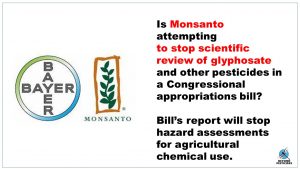02
Jul
Another Sneak Attack on Science (With Monsanto’s Fingerprints?) –Protect Independent Government Evaluation of Pesticide Hazards
 (Beyond Pesticides, July 2, 2018) The U.S. House of Representatives is considering an appropriations bill that includes “report language” that would restrict independent evaluation of pesticide hazards by the Agency for Toxic Substances and Disease Registry (ATSDR), part of the Centers for Disease Control and Prevention. The report language, as part of the U.S. House of Representatives Department of the Interior, Environment, and Related Agencies FY2019 Appropriations Bill, directs ATSDR to “focus on its core mission of assessing hazardous exposures and working with communities, if requested, near toxic waste sites and not agricultural operations” [emphasis added]. As some may recall from “The Monsanto Papers,” Monsanto pushed to stop ATSDR from researching the cancer-causing properties of its herbicide Roundup/glyphosate. [Unsealed internal Monsanto documents from a federal lawsuit, dubbed “The Monsanto Papers,” showed evidence of questionable research practices by the company, inappropriate ties to a top EPA official, and possible “ghostwriting” of purportedly “independent” research studies.] There is also a significant cut to the budget. The Senate Appropriations Committee does not include the same restrictive language.
(Beyond Pesticides, July 2, 2018) The U.S. House of Representatives is considering an appropriations bill that includes “report language” that would restrict independent evaluation of pesticide hazards by the Agency for Toxic Substances and Disease Registry (ATSDR), part of the Centers for Disease Control and Prevention. The report language, as part of the U.S. House of Representatives Department of the Interior, Environment, and Related Agencies FY2019 Appropriations Bill, directs ATSDR to “focus on its core mission of assessing hazardous exposures and working with communities, if requested, near toxic waste sites and not agricultural operations” [emphasis added]. As some may recall from “The Monsanto Papers,” Monsanto pushed to stop ATSDR from researching the cancer-causing properties of its herbicide Roundup/glyphosate. [Unsealed internal Monsanto documents from a federal lawsuit, dubbed “The Monsanto Papers,” showed evidence of questionable research practices by the company, inappropriate ties to a top EPA official, and possible “ghostwriting” of purportedly “independent” research studies.] There is also a significant cut to the budget. The Senate Appropriations Committee does not include the same restrictive language.
The Agency for Toxic Substances and Disease Registry (ATSDR) is a federal public health agency of the U.S. Department of Health and Human Services charged with protecting communities from harmful health effects related to exposure to natural and human-made hazardous substances.
ATSDR’s unique focus is on the impact of hazardous substances on human health –attempting to ensure that Americans have a safe and healthy environment in which to work, play, and live. The agency also responds to environmental health emergencies; investigates emerging environmental health threats; conducts research on the health impacts of hazardous waste sites; and builds the capabilities of, and provides actionable guidance to, state and local health partners. It is the only federal agency that works directly with concerned citizens and communities to address environmental hazards.
In its examination of hazardous chemicals in the environment, ATSDR has developed toxicological profiles for many pesticides, including chlorpyrifos, but not yet glyphosate. The toxicological profiles examine in detail hazards of, and routes of exposure to, the chemicals. Because the profiles contain results based on real world exposures, they are generally held in higher regard than risk assessments produced by the U.S. Environmental Protection Agency (EPA). It is important to maintain the ability of ATSDR to continue to examine agricultural hazards.
Tell your U.S. Senators and Representative reject language, attached to the House appropriations bill, that prohibits independent evaluation of agricultural chemical hazards by the government’s research agency (ATSDR)
Letter to Congress:
Protect the independent evaluation of agricultural hazards by ATSDR
Please ensure that the Agency for Toxic Substances and Disease Registry (ATSDR) remains able to address all toxic chemical threats. Do not support report language to the final bill that eliminates the agency’s assessment of health effects caused by agricultural pesticide and other chemical use. This information is critical to the protection of health and the environment, and language prohibiting this type of assessment should be stripped out of the report accompanying the legislation.
Report language, as part of the U.S. House of Representatives Department of the Interior, Environment, and Related Agencies FY2019 Appropriations Bill, directs ATSDR to “focus on its core mission of assessing hazardous exposures and working with communities, if requested, near toxic waste sites and not agricultural operations.” Please ensure that this language is removed from the report of the final bill.
ATSDR is a federal public health agency of the U.S. Department of Health and Human Services charged with protecting communities from harmful health effects related to exposure to natural and human-made hazardous substances.
ATSDR’s unique focus is on the impact of hazardous substances on human health –attempting to ensure that Americans have a safe and healthy environment in which to work, play, and live. The agency also responds to environmental health emergencies; investigates emerging environmental health threats; conducts research on the health impacts of hazardous waste sites; and builds the capabilities of, and provides actionable guidance to, state and local health partners. It is the only federal agency that works directly with concerned citizens and communities to address environmental hazards.
In its examination of hazardous chemicals in the environment, ATSDR has developed toxicological profiles for many pesticides, including chlorpyrifos, but not yet Monsanto’s glyphosate –after Monsanto pushed to stop ATSDR from researching its carcinogenicity. The toxicological profiles examine in detail hazards of, and routes of exposure to, the chemicals. Because the profiles contain results based on real world exposures, they are generally held in higher regard than risk assessments produced by the U.S. Environmental Protection Agency (EPA). It is important to maintain the ability of ATSDR to continue to examine agricultural hazards.
Please do not prevent ATSDR from addressing agricultural hazards, and maintain an adequate funding level for the agency.
Sincerely,










